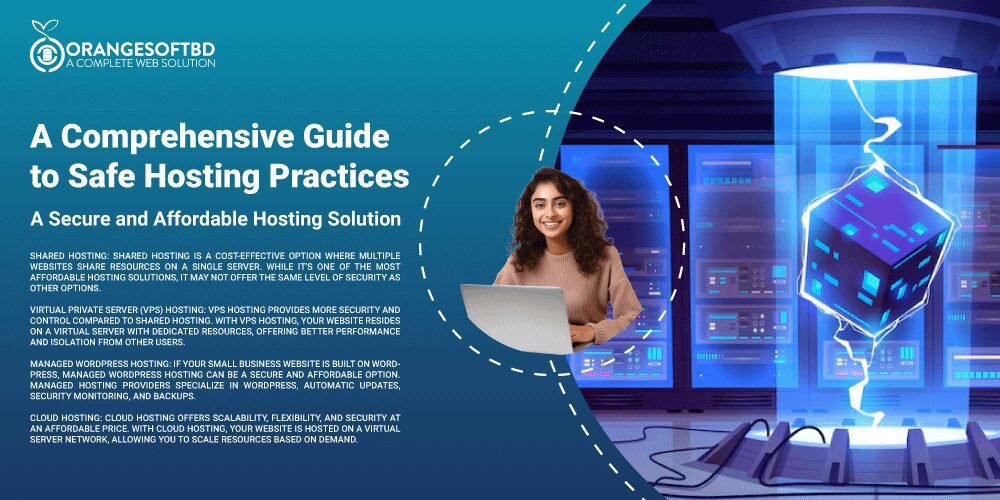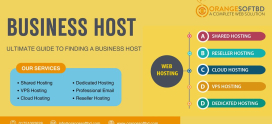
A Comprehensive Guide to Safe Hosting Practices
Safe Hosting: A comprehensive guide to such practices is essential to ensure the security, integrity, and reliability of your hosting environment. Firstly, it’s crucial to choose a reputable hosting provider that prioritizes security measures such as regular backups, SSL encryption, and robust firewalls.
Implementing strong passwords and enabling two-factor authentication adds an extra layer of defense against unauthorized access. Regularly updating software, including content management systems and plugins, helps patch vulnerabilities that could be exploited by cyber threats.
Additionally, monitoring website traffic and server logs can help detect suspicious activities early on, allowing for timely intervention. Educating yourself and your team on best practices for handling sensitive data and conducting regular security audits are also integral parts of maintaining a safe hosting environment.
By adopting these practices diligently, you can safeguard your website and protect both your data and your users’ information from potential security breaches.
Ensuring Digital Security Through Advanced Safe Hosting Techniques
Ensuring digital security through advanced safe hosting techniques involves implementing a range of strategies and technologies to protect sensitive data and infrastructure from cyber threats. Here’s a comprehensive guide on some key practices:
- Encryption: Encrypt data both at rest and in transit using strong encryption algorithms. This ensures that even if attackers gain access to the data, they won’t be able to decipher it without the encryption keys.
- Multi-Factor Authentication (MFA): Enforce MFA for accessing critical systems and sensitive data. This adds an extra layer of security by requiring users to provide multiple forms of verification, such as a password and a one-time code sent to their phone.
- Regular Software Patching and Updates: Keep all software and systems up to date with the latest security patches and updates. Vulnerabilities in software can be exploited by attackers, so timely patching is crucial to reducing the risk of compromise.
- Security Awareness Training: Educate employees and users about best practices for digital security, including how to recognize phishing attempts, the importance of strong passwords, and the risks of sharing sensitive information.
- Secure Development Practices: Follow secure coding practices when developing and deploying applications. This includes input validation, proper error handling, and using frameworks with built-in security features.
- Compliance with Regulations: Ensure compliance with relevant data protection regulations and industry standards, such as GDPR, HIPAA, PCI DSS, etc. Compliance frameworks provide guidelines for securing sensitive data and protecting user privacy.
By implementing these advanced safe hosting techniques, organizations can significantly enhance their digital security posture and mitigate the risk of cyber threats.
How to Choose a Safe Hosting Provider
Choosing a safe hosting provider is crucial for ensuring the security and reliability of your website or application. Here are some key factors to consider when selecting a hosting provider:
- Reputation and Reliability: Research the hosting provider’s reputation and reliability. Look for reviews and testimonials from other customers to gauge their satisfaction level with the provider’s services.
- Security Features: Evaluate the security features offered by the hosting provider. This includes measures such as SSL/TLS encryption, firewalls, DDoS protection, intrusion detection/prevention systems, and regular security updates.
- Data Center Security: Inquire about the security measures implemented at the provider’s data centers. This includes physical security measures such as access controls and environmental controls to protect against power outages and environmental hazards.
- Compliance Certifications: Check if the hosting provider complies with relevant security and privacy regulations, such as GDPR, HIPAA, PCI DSS, etc. Compliance certifications demonstrate the provider’s commitment to maintaining high security standards and protecting customer data.
- Backup and Disaster Recovery: Ensure that the hosting provider offers reliable backup and disaster recovery solutions. Regular data backups and the ability to restore data in case of a disaster or security incident are essential for minimizing downtime and data loss.
- Technical Support: Assess the quality and responsiveness of the hosting provider’s technical support team. Prompt and knowledgeable support is crucial for addressing security concerns, resolving issues quickly, and maintaining the uptime of your website or application.
- Scalability and Performance: Consider your scalability and performance requirements when choosing a hosting provider. Ensure that the provider offers scalable hosting solutions that can accommodate your growing needs without compromising security or performance.
- Price and Value: Compare the pricing and value offered by different hosting providers. While cost is important, prioritize providers that offer good security features, reliability, and support at a reasonable price.
By considering these factors and conducting thorough research, you can choose a safe hosting provider that meets your security, reliability, and performance requirements.
The Benefits of Safe Hosting Technology: Encryption for Data Security
Safe hosting technology, particularly encryption, offers several benefits for data security:
- Confidentiality: Encryption ensures that sensitive data remains confidential by scrambling it into an unreadable format. Only authorized parties with the decryption key can access and decipher the encrypted data. This helps prevent unauthorized access and data breaches.
- Data Integrity: Encryption helps maintain the integrity of data by detecting any unauthorized modifications or tampering attempts. If encrypted data is altered without proper authorization, decryption will fail or produce incorrect results, signaling potential tampering.
- Compliance Requirements: Many regulatory standards and data protection laws require organizations to encrypt sensitive data to protect customer privacy and comply with legal requirements. Implementing encryption can help organizations meet these compliance obligations, avoiding fines and legal repercussions.
- Protection Against Insider Threats: Encryption safeguards data from insider threats, including malicious employees or contractors who may attempt to access or steal sensitive information. Even if insiders gain access to encrypted data, they cannot decipher it without the encryption keys, reducing the risk of insider attacks.
- Secure Data Transfer: Encryption ensures secure transmission of data over networks, such as the internet or internal networks. Technologies like SSL/TLS encrypt data during transit, preventing eavesdropping and man-in-the-middle attacks by malicious actors attempting to intercept sensitive information.
- Customer Trust and Reputation: Implementing encryption demonstrates a commitment to data security and customer privacy, enhancing trust and confidence among customers, partners, and stakeholders. Strengthening data security measures can bolster an organization’s reputation and differentiate it from competitors.
- Versatility and Compatibility: Encryption technologies are versatile and compatible with various systems, applications, and platforms. Whether encrypting data at rest in databases, files, or cloud storage, or encrypting data in transit between servers and clients, encryption solutions are adaptable to different environments and use cases.
- Risk Mitigation: Encryption helps mitigate the risk of data breaches, financial losses, reputational damage, and legal liabilities associated with unauthorized access to sensitive information. By implementing encryption as part of a comprehensive security strategy, organizations can reduce the overall risk exposure to cyber threats.
Overall, encryption is a fundamental component of safe hosting technology, providing robust protection for sensitive data and bolstering the security posture of organizations across industries.
A Secure and Affordable Hosting Solution for Small Businesses
For small businesses seeking a secure and affordable hosting solution, there are several options to consider that balance security, reliability, and cost-effectiveness:
- Shared Hosting: Shared hosting is a cost-effective option where multiple websites share resources on a single server. While it’s one of the most affordable hosting solutions, it may not offer the same level of security as other options.
- Virtual Private Server (VPS) Hosting: VPS hosting provides more security and control compared to shared hosting. With VPS hosting, your website resides on a virtual server with dedicated resources, offering better performance and isolation from other users.
- Managed WordPress Hosting: If your small business website is built on WordPress, managed WordPress hosting can be a secure and affordable option. Managed hosting providers specialize in WordPress, automatic updates, security monitoring, and backups.
- Cloud Hosting: Cloud hosting offers scalability, flexibility, and security at an affordable price. With cloud hosting, your website is hosted on a virtual server network, allowing you to scale resources based on demand.
- Website Builders with Hosting: Some website builders and Shopify, offer integrated hosting solutions as part of their packages. These platforms provide easy-to-use website building tools, along with hosting services and security features built-in.
It’s essential to balance affordability with the level of security and performance required for your business needs. Additionally, prioritize reputable hosting providers with a track record of reliability and excellent customer service to ensure a positive hosting experience for your small business.
Conclusion
Prioritizing safe hosting practices is essential for anyone operating a website or online platform in today’s digital landscape. By following a comprehensive guide that encompasses key measures such as selecting a reputable hosting provider, implementing strong security protocols, regularly updating software, monitoring website traffic, and conducting security audits.
You can significantly reduce the risk of security breaches and ensure the integrity and reliability of your hosting environment. Safeguarding your website not only protects your data but also fosters trust with your users, ultimately contributing to a positive online experience for all parties involved. Remember, the effort invested in implementing and maintaining safe hosting practices is well worth the peace of mind and security it provides in the long run.













